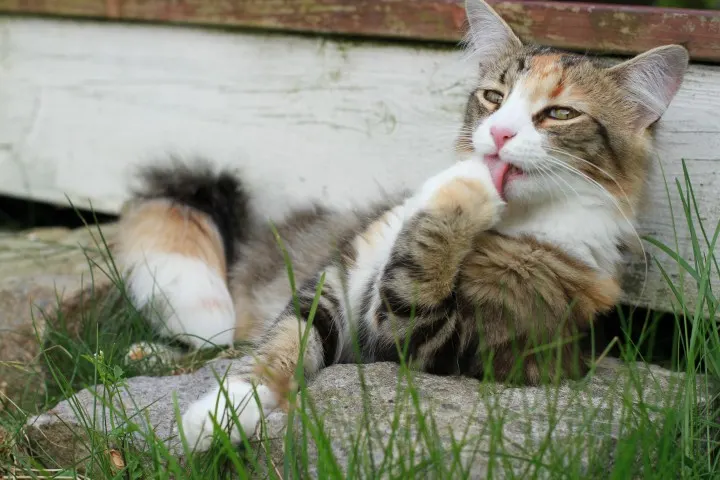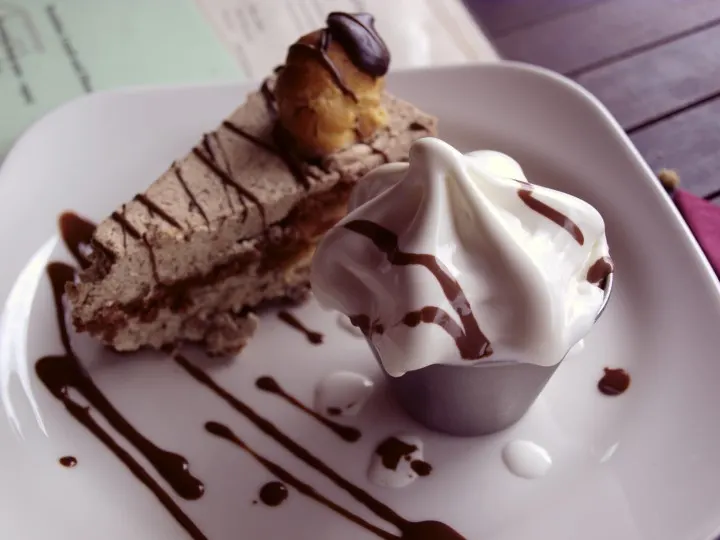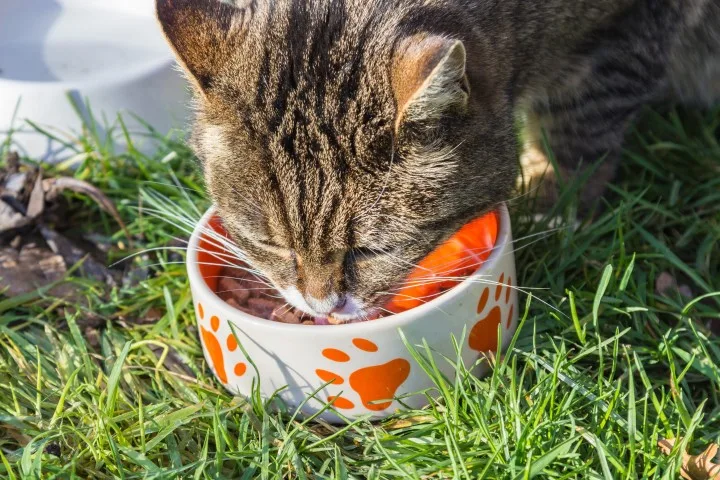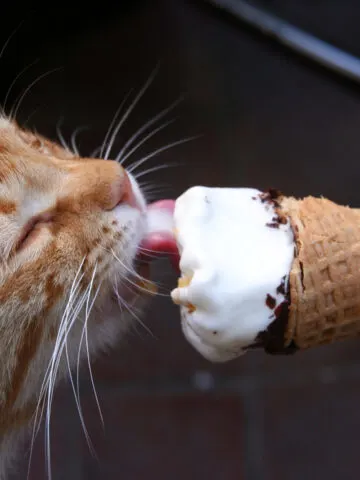People worldwide assume that cats can have ice cream because milk and cats go together, so why wouldn’t cats and ice cream? There’s no difference, right? Actually, this is a misconception, and it may be a deadly one at that.
 Cats can eat ice cream, but it needs to be in moderation and nothing other than pure, plain vanilla ice cream.
Cats can eat ice cream, but it needs to be in moderation and nothing other than pure, plain vanilla ice cream.
Other ice creams include additives, and some include chocolate, which is toxic to your feline and could kill her. Also, your cat is lactose intolerant. The ice cream should be saved for special occasions.
Let’s take a moment to look over this topic a bit more so you can understand why it’s not a great idea to give your cat any other type of ice cream other than vanilla. We’ll also discuss some reasons you should think about refraining from giving your cat ice cream altogether.
Can Cats Eat Ice Cream?
 As the days get warmer, our foods start to change. One thing you may have noticed is you may have been eating more ice cream lately. And to no surprise, as you eat more ice cream, your cats are probably interested in the tasty treat too.
As the days get warmer, our foods start to change. One thing you may have noticed is you may have been eating more ice cream lately. And to no surprise, as you eat more ice cream, your cats are probably interested in the tasty treat too.
More often than not, ice cream is okay for your cat to have as long as it’s pure vanilla and it doesn’t have any additives or coloring in it. Some ice cream has hidden ingredients that can wreak havoc on your feline’s health.
To keep this from happening, we suggest your cat only eats pure vanilla ice cream that way, you don’t need to guess which ice cream is better for your cat and possibly end up risking its health.
Can Cats Eat Vanilla Ice Cream?
So, now on to the technicalities about which ice creams your kittens can eat in moderation and which ones they should avoid at all costs. The first one is vanilla ice cream in its purest form. This is most likely the safest option for your cat. Because there are no additional ingredients in this ice cream, chances are your cat will be okay after a few bites.
Can Cats Eat Flavored Ice Cream?
 We could sit here and list every sort of ice cream and tell you whether or not it is suitable for your pets. But you have a lot on your plate! You don’t want that.
We could sit here and list every sort of ice cream and tell you whether or not it is suitable for your pets. But you have a lot on your plate! You don’t want that.
Honestly, in our opinion and the opinion of veterinarians, your cat should not be offered any other type of ice cream other than vanilla that’s in its purest form. It’s just not worth the risk.
If your cat gets a single lick of your flavored ice cream, it’s okay. But we suggest you refrain from giving it any more than it’s already had to reduce the risk of an adverse event.
Ice Cream With Additions In It Can Be Fatal To Your Cat
Add-on ice creams, on the other hand, may include substances that are fatal to cats. Cherry Cordial ice cream, for example. Given that it is sugary ice cream, your cat is unlikely to be intrigued.
However, if they are and you feed them a significant amount, you would likely believe it was alright because cherries aren’t particularly harmful to cats.
What you’re overlooking are the chocolate bits hidden within a cherry cordial ice cream. A reasonable amount of chocolate could be enough to poison your feline. Whenever it pertains to flavored ice cream, stay licking the bowl, or don’t lick it at all to be cautious.
Is Ice Cream Safe For Cats?
 When it comes to ice cream, the conclusion of its safety is complicated. It all depends on what type of ice cream you want to feed your cat.
When it comes to ice cream, the conclusion of its safety is complicated. It all depends on what type of ice cream you want to feed your cat.
If you’re thinking of feeding your cat some of your Ben and Jerry’s Chunky Monkey, you need to give that second thought as it contains chocolate, which will end up killing your cat.
Cats Are Lactose Intolerant
Feeding ice cream to your kitties should be done with caution. If you’ve read much about cats and milk, you’re aware that they’re lactose intolerant.
Even though most ice creams won’t affect your cats, you should avoid giving them too much of it. A cat’s stomach might be upset by too much ice cream, resulting in vomiting and diarrhea. So you want to save this people’s food for your kitten companion as a special occasion.
Can Cats Die From Eating Ice Cream?
There have been several incidents where cats have died from ice cream, but this is due to the owner not knowing their cat was allergic to a specific ingredient. Also, some people don’t pay attention to the kind of ice cream they’re feeding their feline.
The most important thing is whether or not the ice cream contains chocolate. Chocolate is highly toxic to cats, just like it is to dogs. So, if your ice cream contains chocolate pieces or other dangerous ingredients, it might kill your cat if it consumes it.
Can Cats Eat Non-Dairy Ice Cream?
The answer is not really that straightforward. You must be cautious of the ice cream’s add-ons, just as you would with conventional ice cream. Cats are still at risk from non-dairy chocolate ice cream.
In regards to the lactose concern, it is safe for cats. However, ice cream does not solve all problems. Ice cream is also heavy in fats, and because cats are primarily carnivores, too much fat can contribute to obesity and heart trouble in cats.
Does Cat-Friendly Ice Cream Exist?
Even if your cat won’t be eating your ice cream, that still doesn’t imply they can’t have their very own! There are a plethora of cat-friendly ice cream recipes to choose from.
So, if you would like to prepare your handmade cat ice cream, keep your eyes peeled! Alternatively, you may order some very cute pet ice creams from Amazon and have them delivered right to your home. You can order several different ones to try out on your kitties!
Reasons Not To Give Your Cat Ice Cream
 While ice cream might be safe under certain circumstances to give to your feline, there may be some other reasons why it’s better not to. We discuss these reasons below.
While ice cream might be safe under certain circumstances to give to your feline, there may be some other reasons why it’s better not to. We discuss these reasons below.
Ice Cream Can Cause Brain Freeze In Cats
Attempting to deliberately cause a cat’s brain to freeze is incredibly insensitive. Regardless of how many views you receive on YouTube, don’t do it. When extreme cold creates a rapid shift in the width of the anterior cerebral artery, this is known as “brain freeze.”
Because the brain lacks pain receptors, the pain signal could be coming from the meninges, the brain’s protective covering. The neural system of a cat is similar to that of a person, albeit on a smaller scale.
While a brain freeze is unlikely to kill your cat, it is a suffering she would want to avoid.
Cats Hate The Cold
Reality Check is a sci-fi comic about a cat named Catreece who transforms into a humanoid creature in virtual worlds. Catreece gets a taste for snow cones while in cyberspace and is warned that pouting won’t keep one from melting. This may be accurate in Catreece’s online persona, but not in real life.
Cats, on the other hand, have a higher temp than people, thus they become cold sooner. Newborn kittens are unable to generate their own body heat and are at risk of freezing to death. Cats are drawn to the warmest location in the house, even as adults.
Cats Are Lactose Intolerant
 This indicates that cats lack the lactase enzyme, which is needed to digest the lactose that’s in the milk. Please remember that the concentration of these enzymes in certain cats may be more than in others.
This indicates that cats lack the lactase enzyme, which is needed to digest the lactose that’s in the milk. Please remember that the concentration of these enzymes in certain cats may be more than in others.
You could offer her an itsy bitsy bit and observe her reaction to see if she reacts poorly. When your cat no longer requires milk, she will lose the ability to metabolize it.
The lactose that hasn’t been processed will only give her diarrhea, and that’s on a good day. On a poor day, it will ferment along with most of the other acids in her system, causing her excruciating pain.
What To Do If Your Cat Eats Ice Cream
Don’t be alarmed if you leave the room from your ice cream only to discover that your kitty has gobbled a significant portion of it.
The measures you must take next will vary depending on the specific ice cream and the quantity. Don’t worry if it was vanilla. Simply keep an eye on your cat for the remainder of the night and keep an eye out for any stomach aches or accidents.
However, we suggest keeping an eye on your cat’s behavior for the next 24 hours if you spotted your cat eating a little of your flavored ice cream. If they only got a few bites, they’re probably okay.
However, if your cat begins to act weird or lethargic, you should take them to the veterinarian right away. Or, if they got into anything chocolate, it’s crucial to take them in immediately. Don’t wait it out; it’s best to be safe than sorry.
Heather is an animal lover that has many of them herself. She currently has her Blue Nose Staffy named Bootsie, but she’s catered to many animals over the years including guinea pigs, alpacas, cockatiels, cockatoos, bunnies, chinchillas, hedgehogs, and more. She believes that knowledge should be the foundation of caring for any pet.



Leave a comment
You must be logged in to post a comment.